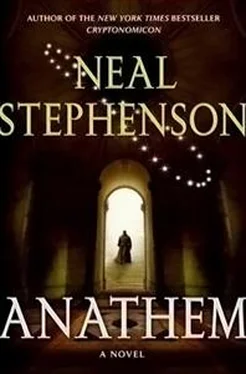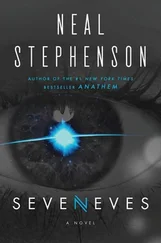“Yes. And the others regained consciousness in a worldtrack in which you and I are dead.”
“Dead.”
“That is what I told you.”
“So that’s why they left us behind,” I said. “They didn’t leave us behind, because, in their worldtrack, we never even made it here.”
“Yes. Put this on.” He handed me a full-face respirator.
“What of the Fthosian astronomer? Won’t she summon the authorities, or something?”
“She went with Jules. He is talking to her. He has a gift for that kind of thing.”
“So Lio, Arsibalt, Jesry, and Sammann are just wandering around the ship openly, looking for someone to surrender to?”
“Such a worldtrack exists.”
“It’s pretty bizarre.”
“Not at all. Such occurrences are common in the confusion of war.”
“How about this worldtrack? What are the four of them doing in the Narrative that you and I are in?”
“I’m in several, ” Fraa Jad said, “a state of affairs that is not easy to sustain. Your questions hardly make it easier. So here is a simple answer. The others are all dead.”
“I don’t wish to abide in a worldtrack where my friends are all dead,” I said. “Take me back to the other one.”
“There is no taking, and there is no back,” Jad said. “Only going, and forward.”
“I don’t want to be in a Narrative where my friends are dead,” I insisted.
“Then you have two choices: put yourself out the airlock, or follow me.” And Fraa Jad pulled the respirator over his face, terminating our conversation. He handed me a fire extinguisher, and took one for himself. Then he shoved off down the corridor.
Now my mind did something absurd, namely, attended to the nuts and bolts of the ship instead of things that were truly important. It was as though some Barb-like part of me had stepped to the fore, elbowed my soul out of the way, and directed all of my energies and faculties toward those things that Barb would find interesting, such as door-latching mechanisms. Subsystems responsible for irrelevancies such as grieving for my friends, fearing death, being confused about the worldtracks, and wanting to strangle Fraa Jad, were starved of resources.
There were many doors, all closed but not locked. This was, according to Jules, the usual state of affairs here. These outer reaches of the ship were divided into separate, independently pressurized compartments so that a meteor strike in one wouldn’t beggar its neighbors. Consequently, one spent an inordinate amount of time opening and closing doors. These were domed round hatches about three feet in diameter, with heavy bank-vault-like latching mechanisms. One opened them by grabbing two symmetrical handles and pulling them opposite ways, which was handy in zero gravity where planting one’s feet and using one’s body weight were not supported by theorical law. The effort always left me panting for breath in Fraa Jad’s wake. One of the questions I had meant to annoy him with had been, Why me? Can’t you do whatever it is you are doing alone, so that I can be in a Narrative where my friends are alive? And maybe this was the answer. I’d been picked out for the same reason that the hierarchs at Edhar had made me part of the bell-ringing team: I was a lummox. I could open heavy doors. It seemed preferable to doing nothing, so I floated ahead of Fraa Jad and applied myself to it. Every time I hauled one open I expected to find myself staring down the muzzle of an Urnudan space marine’s weapon, but there simply weren’t that many people here in the observatory, and when we did finally encounter someone in a corridor, she gasped and got out of our way. The firefighter disguise was so simple, so obvious, I’d assumed it could never work. But it had worked perfectly on the first person we’d met, which probably meant it would work as well on the next hundred.
That corridor led to a spherical chamber that apparently served as the foyer for the whole vertex. We had to pass through it, anyway, to get out of this vertex and reach other parts of the Daban Urnud . As we discovered by trial and error, one of its exits communicated with a very long tubular shaft. “The Tendon,” I announced, when I discovered it. Fraa Jad nodded and launched himself down it.
The stupendous icosahedron and its imposing vertex-citadels had accounted for almost all of my impressions of the ship until now. Their size and their strangeness made it easy to forget that essentially all of the Daban Urnud’ s complexity and population lay elsewhere: in the spinning Orbstack. Until now, Fraa Jad and I had been like a couple of barbarians kicking down doors in an abandoned guardhouse on the frontier of an empire. Here, though, we had set out on the road that would take us to the capital. There were a dozen Tendons. Six radiated from each of the mighty bearings at the ends of the Orbstack. The Orbstack was like a monkey using its arms and legs to brace itself in the middle of a packing crate. Sometimes an arm had to push, sometimes it had to pull. It flexed to absorb shocks. It was alive: a bundle of bones that gave strength, muscles that reacted, vessels that transported materials, nerves that communicated, and skin that protected all of the rest. The Tendons had to perform all of the same functions, and so shared much of that complexity. All that Fraa Jad and I could see of this Tendon was the inner surface of a ten-foot-diameter shaft, but we knew from talking to Jules that the Tendon as a whole was more than a hundred feet wide, and crammed with structure and detail hidden from our view—but richly hinted at by a bewilderingly various series of hatches, valve-wheels, wiring panels, display screens, control panels, and signs that shimmered by us as we flew along. Since it was impossible for novices such as we to get aimed perfectly down the center, we strayed from side to side as we went along. Whenever we came in slapping range of a likely-looking handhold we’d give it a bit of abuse and earn some speed, then take a lot of deep breaths while coasting to the next. About halfway along, we encountered a group of four Geometers who, when they saw us coming, grabbed handholds and crouched against the wall to make way. As we flew by, they shouted what I assumed were questions, which we had little choice but to ignore.
The hatch at the end opened onto a domed chamber about a hundred feet across: by far the largest open volume we had yet seen. I knew it had to be the forward bearing chamber. This was confirmed by the fact that it had a navel in its floor, perhaps twenty feet across, and everything that we could see on the other side of it was rotating. We had reached the forward end of the Core. Surrounding but invisible to us was the immense bearing that connected the spinning Orbstack to the non-spinning complex of icosahedron and Tendons that guarded it.
It was a mess. Half a dozen Tendon-shafts were plumbed into this thing via huge portals shot into its domed “ceiling.” Fraa Jad and I had just emerged from one of them. The adjacent one was the focus of a huge amount of activity and attention—it looked like one of those pits in great cities where stocks are traded. This, of course, was the Tendon that led to the World Burner complex, or what was left of it now that the Valers had got to it. People were flying in to, or issuing from, it at a rate of about two per second—it was like watching the entrance of a hornet’s nest in high summer. Most of those going into it were carrying weapons or tools. Some of those coming out were injured. The ingoing and outcoming streams collided in the bearing chamber, and others tried to sort things out, to tell people where to go, what to do, without much result that I could discern, save that they ended up arguing with each other. I was just as happy I couldn’t understand what they were saying. The chaos made it almost too easy for me and Fraa Jad to move around without attracting notice. In fact, my only problem was distinguishing the Thousander from other men in firefighting gear. But after a brief moment of anxiety when I feared I’d lost him, I spied a likely-looking firefighter gazing in my direction and pointing toward what I had begun to think of as the floor of the chamber: the flat surface with the big hole in the middle of it.
Читать дальше





